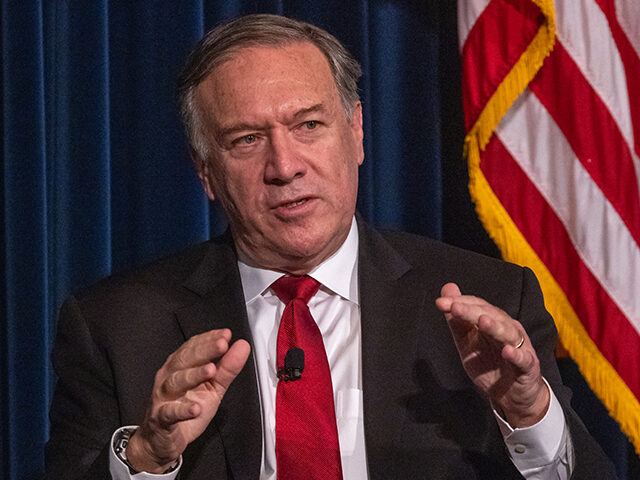OKLAHOMA CITY, Oklahoma — Former Secretary of State Mike Pompeo told Breitbart News exclusively that Democrat President Joe Biden’s energy policies have hurt the United States on the world stage and domestically, empowering the nation’s adversaries and undercutting the country’s relationships with allies.
“On both sides—our allies don’t trust us to produce the products that they need, and our adversaries see two opportunities,” Pompeo said in an interview. “One is to sell their stuff, and Russia is selling crude oil well above market pricing today because they have captured markets, and they are selling it to our primary adversary, the Chinese Communist Party. They are changing pipeline flows to go from Europe to the East. They’re building out economic models that no longer count on the United States of America to produce their energy. That is enormously risky for the United States, and our adversaries can certainly see it. They’re taking advantage of it.”
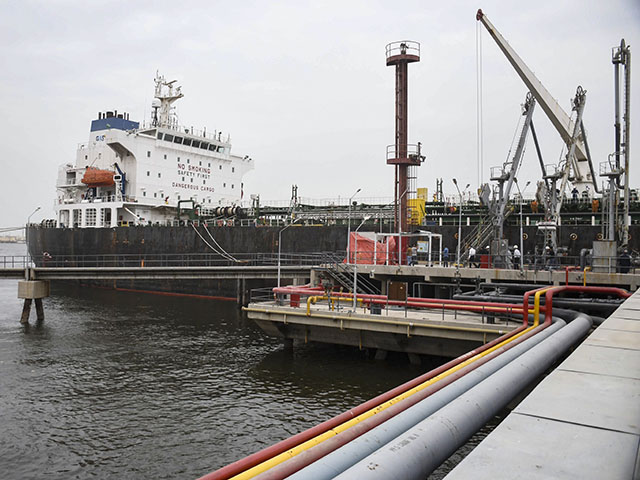
Pompeo’s interview came at the American Energy Security Summit here in Oklahoma City at the Hamm Institute for American Energy at Oklahoma State University where world leaders and industry titans are gathered to discuss, at the first-of-its-kind summit, how energy policy intersects with national security.
Pompeo, who first served in Congress as a U.S. representative from Kansas, then later as CIA director for now-former President Donald Trump and eventually as Trump’s secretary of state, lit into Biden for depleting the Strategic Petroleum Reserve at the beginning of his presidency, something Biden has still not refilled.
“We filled it. We filled it at a really good price as well. So we did a really good term for the American taxpayer as well,” Pompeo told Breitbart News. “Look, the Strategic Petroleum Reserve is exactly that. It is the Strategic Petroleum Reserve, not the Strategic Political Reserve. That’s how the Biden administration has treated it. When their polling gets bad and energy prices spike, they release some product from the reserve. You should know it’s a little more complicated; it’s not just like, ‘Hey, Charlie. Drive the truck down there.’ But, nonetheless, that was the idea. But remember the world consumes, in crude oil, about 101 million barrels a day—100, 101, or 102, somewhere in that range. No release from the Strategic Petroleum Reserve is going to have an impact on the cost for consumers for gasoline; there’s too much that goes into that. It’s kind of a silly thing. It’s a press release, not an actual mathematical solution. Now, the United States is in a position where the Chinese Communist Party is threatening, and Vladimir Putin is threatening to launch a nuclear weapon, and we got the lowest reserves in, I think, it’s the last 50 or 60 years ever possessed. That’s not a good combination.”
Pompeo said the whole rest of the world understands the importance of energy to survival—something sometimes some in the United States take for granted.
“It is the case the entire world, whatever the political hierarchy may be saying, understands that you’ve got to turn the lights on,” Pompeo said. “So when we think of energy, we think of almost always pictures of cars. When the rest of the world thinks of energy, it’s about, ‘Can you actually cool your home, turn the lights on, and have sanitation? Can you actually deliver power across transmission lines?’ They think of things like food. Do you have enough fertilizer driven by energy? Do you have enough fertilizer to put it in your fields and feed your children? So there’s two very different perceptions of the populace than we have here in the United States. It’s a little bit because we’re blessed to be a very prosperous and wonderful place—we should be very proud of that. But we should not forget the centrality of energy to everything we do. In the Trump administration, we understood a couple things—one is it was both in America’s interest and in the world’s interest to make sure we become the world’s largest producer of LNG. It creates jobs, profits for businesses, therefore, taxes for the government—all things that are foundational for the American enterprise—a better foundation for dollar trade, for the U.S. dollar trade because these commodities are almost exclusively traded in dollars. But second, we also knew if we get this wrong we will have a lot of nations around the world that will present risk, and they will buy this energy from places that are adversaries to the United States. So both ends suggested the correct policy for the United States was to deliver American technology. When you think American energy, think technology. All the amazing companies delivering the technology, but then also the products—then the companies delivering not only the unrefined products we think about, like natural gas and crude oil, but chemicals, gasoline, diesel. Produce them in volume, and we will make America a lot more secure.”
Pompeo, in remarks at the opening ceremony here on Sunday evening as the conference kicked off, noted that almost every meeting he had as CIA director and as secretary of state had an energy component to it. Asked about that here, Pompeo said every nation worldwide knows that energy is the ticket to prosperity. He also said his successor Secretary of State Antony Blinken—Biden’s top diplomat—faces similar issues worldwide but that the Biden administration’s woke policy priorities on things like climate change and LGBTQ issues, rather than a clearer America First vision like the Trump administration had, complicate matters and causes distrust around the world.
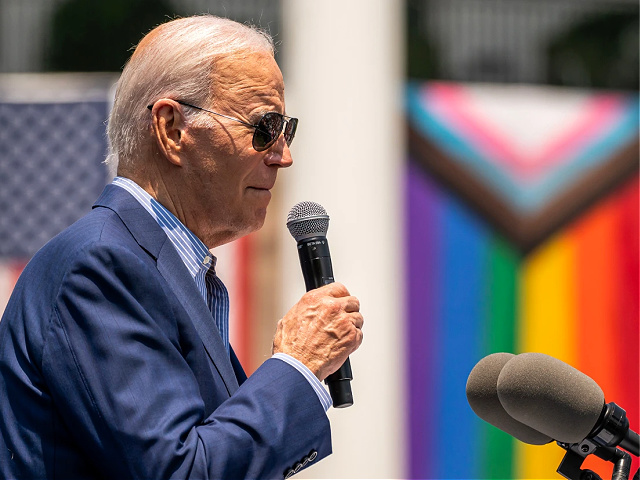
“Almost every meeting had a significant energy component. It would vary. If you’re in Central Asia, they wanted to know they had the ability to move their product through pipelines that had safe transit,” Pompeo said. “If you’re talking to Iraq, they wanted to know they had the capacity to generate electricity no matter what the Iranians did to them. It takes a different shape in each geography or each nation, but they all knew their capacity to lead their country depends on affordable energy. Just as we have political fights here over energy, they knew in their country if it becomes too expensive for ordinary citizens to turn on their gas stove or to find the capacity to run their farm implements, they knew their political power would wane. So it literally, whether you were in Bangladesh or Vietnam or Sub-Saharan Africa, every one of those places depended fundamentally on energy, and they would watch, and I suspect this is true—it is absolutely the case this is true for Secretary Blinken, that these folks are talking to him about it—but this administration is leading with climate change and LGBTQ policy. When our ambassadors today approach the world, that is at the top of their list. We had America First and religious freedom, if you’re trying to capture the differences between the two administrations. When they hear the United States talk about ‘climate change,’ what they immediately hear is, ‘Oh, you’re trying to starve us.’ It’s not what we’re saying, but that’s what they hear because they know the net effect of trying to transition away from molecules and away from energy—they know what it means for their country. They’re just not going to have it. We can have all the fancy meetings we want in Brussels and Paris, but today, they are acutely aware they are burning coal and dung and wood, and they are happy to move to U.S.-made affordable LNG or natural gas. Frankly, they’re happy to move to any energy they can afford. But when we start to tell them, ‘No, you can’t do the things you have traditionally done’ while we built our economy over seven years on those very same models, they look at us as both hypocrites and unrealistic.”
Pompeo also said the Biden administration’s obsession with a transition to electric vehicles that the nation is clearly not prepared for is “political” and “not realistic” and that it is emblematic of a broader “anti-energy” agenda from Biden.
“That’s unfortunate. Think about it. The Biden administration came in and shut down the Keystone XL pipeline—an exemplar of their anti-energy policy and anti-fossil fuel policy,” Pompeo said. “They then pulled leases on a massive amount of federal lands where there was exploration and drilling possible to continue to generate affordable energy and then drove through both a set of regulatory policies—ESG and the like, even in the capital markets—and then huge subsidies in the electric vehicle industry in an attempt to make a non-economic transition, and now we can all see: it’s a failed effort. UAW workers are on strike because these vehicles aren’t actually being made here; they’re going to be made in China. You can see consumers rejecting it. I forget the number, but I think GM lost something like $3 billion last year on electric vehicle manufacturing. … To your point, fair enough—continue to work the technology, whatever makes sense. But to demand that taxpayers underwrite this transition on a timeline that no one can point to a technological solution that delivers the outcome they’re seeking is irrational and dangerous and expensive. Ultimately, if your objective is to eventually transition to electric vehicles, you’re creating more risk. It will never happen because everyone will throw up their hands at a problem set that if you said, ‘We’re going to do this over 30 years,’ you might actually evolve the technology in a way that made sense.”
Both Trump and Biden will visit striking UAW workers in Michigan this week. Biden, who will go on Tuesday, only announced he is visiting them after Trump—who is going on Wednesday as counter-programming for the second Republican debate, which, like the first one, he is not attending—said he was going. Asked about what to expect, Pompeo said the workers deserve to be heard—but that these trips are political in nature.
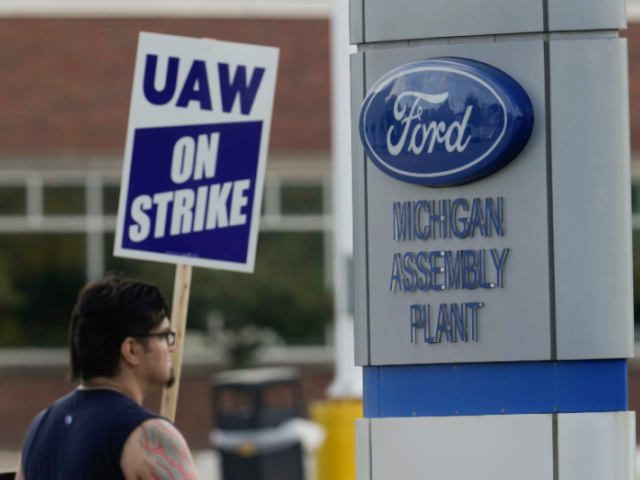
“These are both political trips. The president [Trump] is actively campaigning,” Pompeo said. “President Biden, the same. I hope what they’ll do is they’ll level with those workers. It’s the case that markets are still something I believe in deeply. Those workers have every right to fight for wages and all the things they want. Every company has to make sure it can continue to deliver and invest in a way that makes sense for the business. The businesses have to exist for these workers to have the very jobs we’re describing. I suspect you won’t hear that from either candidate; they will be appealing to different emotions. For me, this is all about, ‘How do you build a dynamic, growing American economy that actually delivers what it is that those workers want?’ Good jobs to take care of their families, to get the government the hell out of their way, and to go build the greatest product that has transitioned more families and more lives than just about any industry here in the United States.”
Assuming a Republican wins the 2024 presidential election—Trump is currently leading the polls in the primary and leads Biden in some general election polls, including one this weekend from ABC News and the Washington Post that has Trump leading Biden by ten points—Pompeo said that the next president has a “tall task” of restoring confidence in the energy industry.
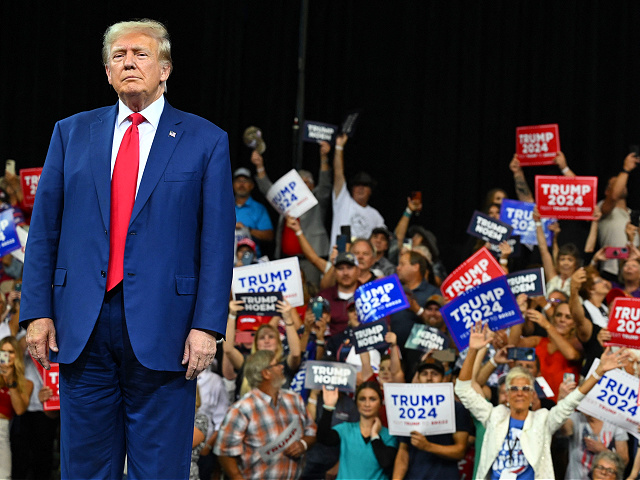
“The things they should do are pretty straightforward,” Pompeo said when asked what a Republican should do if they win the 2024 presidential election. “They should restore the federal land rights and property rights—return those to the states. Second, they should undo some of the massive subsidies that are providing to non-economic energies. Allow those industries to evolve and deliver, but we ought not do that on the backs of the American taxpayer. Lastly, what they should do is deliver a message to the American people—I guess to the world as well, but to the American people—that says, ‘We’re going to provide affordable energy for you and your family. Go invest. Go take risks. Do things you want to do. You want to go drive your family on vacation? Knock yourself out. We’re going to make sure the United States is the most affordable and most abundant energy producer in the world.’ That alone, that flip of a switch, that sentiment—the confidence that would imbue to the people who have to go invest hundreds of millions of dollars to continue to develop the American energy industry will now feel confident that they can. The final piece of that that we often take for granted is we have the most complex, deepest capital markets that support the industrial energy complex. Think fracking facilities, refineries, all of the infrastructure—pipelines, transmission lines—all requires real capital. These are 7- to 15-year projects. You have to have confidence those projects are going to get the return they need not today, but they will get the capital back tomorrow. Who’s going to hire workers to build a transmission line if you don’t think you can get a return on your investment? That’s what I’m seeing today. So the next president is going to have a tall task of restoring what will have been a four-year hiatus in the investment required to preserve affordable energy for America.”

